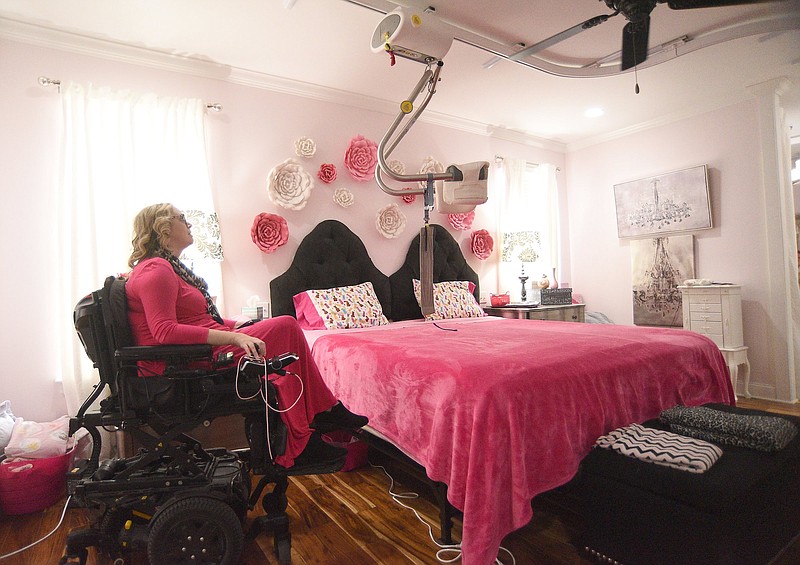Bliss Welch was 17 years old when she began struggling to climb steps and noticing her legs locking when she walked.
It took about three years of traveling to different medical specialists before she was diagnosed with a form of muscular dystrophy that causes progressive weakness and wasting in her leg and arm muscles.
In the early years of her diagnosis, she was still able to walk. But as time went on, the weakness in her legs worsened and began spreading to her upper body, leading her to use a wheelchair.
Photo Gallery
Sen. Bo Watson sponsoring bill for working Tennesseans with disabilities to buy into Medicaid
Welch, who turns 43 this month, now needs a personal care assistant to help with daily tasks, such as getting out of bed, dressing herself, cooking and cleaning.
Despite her disability, Welch holds multiple college degrees and works as an account specialist for a local business — a computer-based job that she’s grateful to be able to do from home.
Although she has a well-paying job with health insurance, Welch is in a predicament that many other working Tennesseans with disabilities face: The insurance through her employer doesn’t cover the care assistance and equipment that she needs in order to work and live.
Tennessee is one of four states that doesn’t have a program allowing adults who meet the federal Social Security definition of having a disability to buy into the state Medicaid program, which in Tennessee is known as TennCare.
TennCare covers long-term services and community-based supports, such as a personal care assistant, in-home physical therapy or nursing, for people with disabilities — but a person can’t have more than $2,000 in assets in order to qualify. That leaves many working Tennesseans in a difficult spot, Welch said.
“People have to make the choice between working and not having the benefits and having to figure out how to pay for them or not working so that they can receive the benefits that they need,” she said.
But Welch and other disability advocates have renewed hope that relief might soon be in sight.
Sen. Bo Watson, R-Hixson, is sponsoring a bill called the “TennCare for Working Individuals with Disabilities Act,” which would require TennCare to establish a buy-in program for working individuals with disabilities that enables those individuals to access health insurance coverage through TennCare, including as a supplement to employer-sponsored coverage.
“These are people who are wanting to be productive citizens, despite whatever limitations they might have, and I think we should try and create pathways to help those kinds of individuals be as successful as possible,” Watson said in a phone interview.
Based on data from other states that have similar programs, an estimated 1,000 to 1,500 working Tennesseans with disabilities would be eligible for the program, according to Tom Jedlowski, a spokesperson for the Tennessee Disability Coalition.
On top of having a personal caregiver, which costs roughly $60,000 per year, Welch said she’s spent an estimated $50,000 out of pocket on equipment in her home that enables her to function more independently.
Some of that equipment includes a ceiling lift to get her in and out of bed, into her wheelchair and to her bathroom to shower, bathe or use the toilet. Another lift in the bathroom enables her to get in and out of the tub, and the base of her bed is adjustable, because she doesn’t have the strength to turn over and reposition herself.
Her house has also been outfitted with automatic door openers and lots of smart devices so things like ceiling fans and light switches aren’t out of reach.
Even with all those expenses, Welch said she would rather keep her job over quitting and forfeiting most of her assets in order to qualify for TennCare. She relies on her income and support from family and friends.
A major motivation is her 12-year-old daughter, she said.
“I want her to know that no matter your circumstance, you have the ability to be self-sufficient,” Welch said. “I want to continue to be a contributing member to society, and that involves working.”
Welch and other disability advocates are hopeful that Tennessee can tap into its shared savings from the latest version of TennCare, of which there was $330 million last year, in order to fund the program.
Gov. Bill Lee and other state leaders have promised to use TennCare’s shared savings each year to provide new and expanded health services to the state’s most vulnerable citizens, including people with disabilities.
Watson, who’s awaiting the fiscal note for the bill, said it’s too soon to say where the funds to support the program would come from — but he emphasized that participants would pay a premium to buy in.
“Which will help offset some of the cost,” he said.
In addition to the financial relief being able the buy into TennCare would provide, Welch said it’s hard to put a price on independence.
“Independence is a very important thing, and for me, it would mean independence from the physical and financial support that I receive from my family,” she said. “I don’t want to take away the fact that I’m very grateful for all the love and support that I have been shown through the years from my friends and family — but it’s also nice to know that you can be self-sufficient.”
Contact Elizabeth Fite at efite@timesfreepress.com or 423-757-6673.

